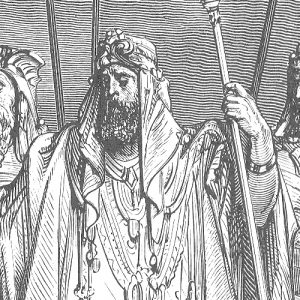Ahab

Bible References
Leviticus 25:23
1 Kings 18:19
1 Kings 20:1-43
1 Kings 21:13, 16, 19, 27-29
2 Kings 9:26
Jeremiah 29:21
(uncle)
- Son of Omri, seventh king of Israel. He married Jezebel, daughter of Ethbaal, king of Tyre, and in obedience to her wishes, caused a temple to be built to Baal in Samaria itself, and an oracular grove to be consecrated to Astarte (see 1 Kings 18:19). One of Ahab’s chief tastes was for splendid architecture, which he showed by building an ivory house and several cities. Desiring to add to his pleasure-grounds at Jezreel the vineyard of his neighbor Naboth, he proposed to buy it or give land in exchange for it, and when this was refused by Naboth in accordance with the Levitical law (Leviticus 25:23), a false accusation of blasphemy was brought against him, and he was murdered, and Ahab took possession of the coveted fields (1 Kings 21:13, 16). Thereupon Elijah declared that the entire extirpation of Ahab’s house was the penalty appointed for his long course of wickedness (see Elijah). The execution, however, of the sentence was delayed in consequence of Ahab’s deep repentance (1 Kings 21:27-29). Ahab undertook three campaigns against Ben-hadad II, king of Damascus, two defensive and one offensive. In the first Ben-hadad laid siege to Samaria but was repulsed with great loss (1 Kings 20:1-21). The next year Ben-hadad again invaded Israel by way of Aphek, on the east of Jordan, yet Ahab’s victory was so complete that Ben-hadad himself fell into his hands, but was released contrary to God’s will (1 Kings 20:22-43) on condition of restoring the cities of Israel and admitting Hebrew commissioners into Damascus. After this great success Ahab enjoyed peace for three years, when he attacked Ramoth in Gilead, on the east of Jordan, in conjunction with Jehoshaphat king of Judah, which town he claimed as belonging to Israel. Being told by the prophet Micaiah that he would fall, he disguised himself, but was slain by “a certain man who drew a bow at a venture.” When buried in Samaria, the dogs licked up his blood as a servant was washing his chariot, a partial fulfillment of Elijah’s prediction (1 Kings 21:19), which was more literally accomplished in the case of his son (2 Kings 9:26).
- A lying prophet who deceived the captive Israelites in Babylon and was burnt to death by Nebuchadnezzar (Jeremiah 29:21)
Smith's Bible Names Dictionary (1866).